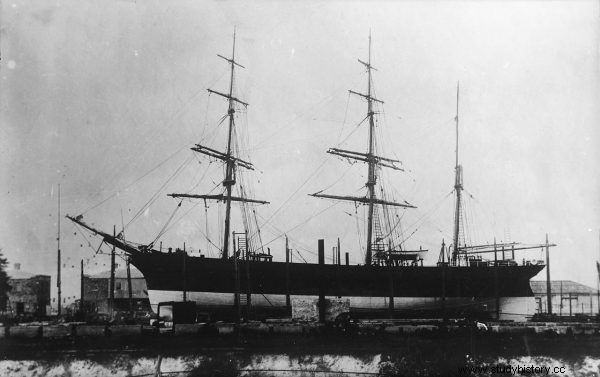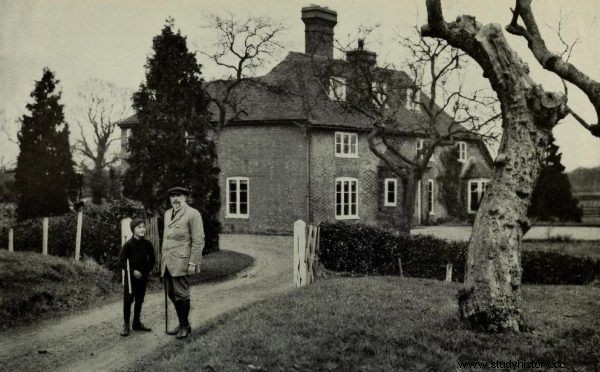His books appear on almost every list of the 100 greatest works of world literature. He himself came from a Polish family, but everyone knows him under a foreign name. Did this genius writer not want to be Polish?
Józef Teodor Konrad Korzeniowski, better known to the world as Joseph Conrad, was born in 1857 in Berdyczów, in the territory annexed by Russia. His parents, Apollo Korzeniowski and Ewa née Bobrowska, belonged to the Polish nobility, deprived of land after the November Uprising.
In the house where the future writer grew up, patriotic traditions were strong. “Pole, Catholic, noble. Apollo and Eve wished he would never forget these three things. ” - writes Jasanoff, an American historian associated with Harvard University in the latest biography of Conrad May. Their devotion to the Polish cause is evidenced by the third name given to their son - Konrad. They took them from the works of Mickiewicz. Especially my father was actively involved in the fight for independence. The mother's family, headed by uncle Tadeusz Bobrowski, kept a bit more distance from the insurgent "madness".
Before Józef left Poland for good at the age of seventeen, he managed to get to know the fate of his countrymen deprived of his state. He accompanied his father in exile in Vologda, from where in 1863 the family moved to Chernihiv. Two years later, the writer's mother died there. He also lost his father early - in 1869. From then on, his closest relative and guardian was Uncle Tadeusz.

Joseph Conrad's father was Apollo Korzeniowski, a Polish nobleman and independence activist.
A "completely natural" trip or "breaking the national bond"?
It was his mother's brother who in 1874 consented to Joseph's move to Marseilles. "Korzeniowski's departure from Poland is the most hotly discussed turning point in his biography," admits Zdzisław Najder, who explored the life of the author of Lord Jim. At the same time, however, he emphasizes that this fact should not be overestimated:
[…] there is no reason to believe that he or anyone around him viewed his departure for France as breaking the national link; for his uncle such arguments would be absurd, and of an escape from European culture Conrad never dreamed of. It should not be forgotten that Poland was not on the map at all then and going abroad to study, work or gain experience was something completely natural for thousands of noble and middle-class youth.
Only the career chosen by the young Korzeniowski was extraordinary. He decided to become ... a sailor. And for the next nineteen years, until January 1894, he actually worked on ships - first French, then British. On the board of the latter, he also gained further ranks, including captain's rank.
He also visited the lion's share of the world. His impressions from those journeys did not leave him until the end of his life, which is clearly seen in his prose, especially "Heart of Darkness", which alludes to the writer's experiences during his expedition into the Congo Free State.
"Your skin is about"
More than a decade after his departure, in 1886, Conrad made efforts to obtain British citizenship. His uncle had been persuading him to do so for years. "Once again, I repeat what I wrote in the previous letter:that while sitting in London for the examen, it would be most appropriate to simultaneously apply for naturalization and end it once," he wrote to Józef. And he would add, "It's about your skin."
All the time Tadeusz was trying to make his nephew throw off the burden of Russian servitude. There was still the specter of many years of military service over him . In his opinion, citizenship of a foreign country would be a good protection for Korzeniowski. He had previously tried to obtain an Austrian or Swiss passport for him, but his plans came to nothing.

One of the ships on which Korzeniowski was sailing was the sailing ship "Otago".
And so on August 18, 1886, Conrad became British. "The applicant is a very respectable person and worthy of a testimony," reported Police Sergeant John Weston, interviewing him. The benefits of naturalization are emphasized by Zdzisław Najder:
By obtaining the above-mentioned certificate, he became the ward of the world's greatest power residing illegally abroad , a full citizen of one of the most liberal and enlightened countries in Europe.
Korzeniowski still had to wait for the final shedding of his ties with Russia. He was released from serfdom only on March 31, 1889. The relevant decree was then issued by the tsarist ministry of internal affairs.
"My point is English"
At that time, Korzeniowski made one more important decision. In the late 1880s, he began writing his first novel, Almayer's Folly. “He changed his name and surname as well as nationality. He wrote in English, not Polish "- emphasizes Maya Jasanoff in the book " Joseph Conrad and the birth of the global world " .

"If I had not been writing in English, I would not have been writing at all," the author admitted years later. Photo from 1904.
Why did a student of Polish patriots decide to create in a foreign language? He himself later claimed it was the result of a natural "inclination":
The truth is that my ability to write English came to me as easily as any innate propensity. I have a special and unwavering feeling that this quality has always been an inseparable part of my being (...).
The property of writing in English fell to me as a discovery, I did not inherit it, and it is precisely the inferiority of my rights to it that makes it all the more valuable to me and obliges me to to prove himself worthy of great happiness throughout his life. (...) everything I have a right to - to be believed when I say that if I had not been writing in English, I would not have been writing at all .
There is probably a lot of truth to this last sentence. Korzeniowski had been absorbing British culture for years, he spoke, wrote and even began to think in the language of Queen Victoria's subjects. "Both at sea and on land, my point of view is English," he noted. There is no doubt that he was attached to his new homeland "When I speak, write or think in English, the word" Home "always means the hospitable shores of Great Britain to me," he admitted in a letter to a friend as early as 1885.
It must have been just as natural for him to make a decision to put a changed name, Joseph Conrad, on the cover of the first book. Though, as Maya Jasanoff points out, there may have been other considerations as well. More and more immigrants appeared on the Islands at the turn of the 20th century and not all of them were welcomed with open arms. "Hearing the name of Korzeniowski, the British would not have thought of the heroic Polish freedom fighters at first, but rather the Jews" - says the American researcher.
"I never forgot"
Korzeniowski gained real fame only after many years. At first, his books, although well-regarded by critics, did not gain much popularity. The breakthrough was the novel "Gra losu", published in January 1914. "Suddenly, a fifty-four-year-old writer had his first bestseller" - Maya Jasanoff reports.
At this stage, hardly anyone remembered the origins of the beloved author. This information sometimes surprised ... even fans of his work. “I knew that Joseph Conrad was not his real name - not entirely, at least. Later I remembered that I knew he was Polish. But then it was completely beyond my mind, "wrote George Palmer Putnam in 1920 during his visit to Krakow.
And how did Conrad himself view the issue? He argued that it should not be inferred that he had become English. Years later, meeting his friend from his youth, Konstantyn Buszczyński, he even recalled that the latter's father had told him:“You will be a sailor. But wherever the ships take you, always remember that you are Polish and that you will return to Poland. " "I never forgot," the writer reportedly added at the end of his story.

Korzeniowski lived in Great Britain until the end of his life.
Although he lived abroad until the end of his life - he died in 1924 in Bishopsbourne, England, where he lived with his wife and sons - he did not give up his traces of Polish identity. He kept his accent strong. "He couldn't pronounce two words in English without revealing that it was not his mother tongue," his friend Ernest Dawson admitted, "he pronounced the word used as two syllables, something like usit ”.
The writer's passport, issued to Konrad Korzeniowski, also reminded us of his Polish origin. His grave, which is located in the cemetery at Canterbury Cathedral, is, however, a testimony to two connected identities. As Maya Jasanoff writes in the book "Joseph Conrad and the birth of a global world" :
There is a quote on the tombstone from Edmund Spenser's "The Faerie Queene" (...). The words "Joseph Teador Conrad Korzeniowski" are written above the quote in small black letters. The English Joseph Conrad broke into the names with which he was baptized in Poland :"Józef Teodor Konrad Korzeniowski". "Theodore" was written with a mistake.
